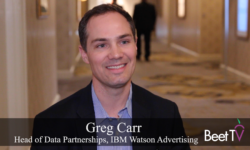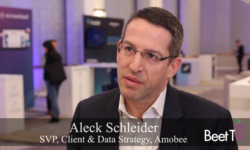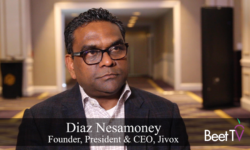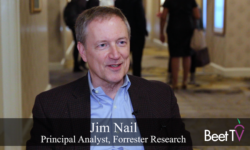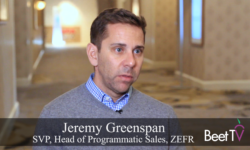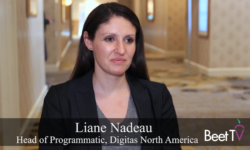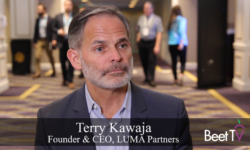SAN FRANCISCO– Contextual targeting has become increasingly part of the industry conversation now that the cookie is going away. In an interview with Beet.TV’s Jon Watts, Scott Kelliher, head of brand advertising and partnerships at eBay, explains how contextual has been a part of his company’s strategy for some time now.
There are a number of different data sources available now to help shape consumer intent. For eBay, consumer intent is pretty much built in. When someone comes to their site to buy something, it’s an act of intent.
“For us, we feel like we know who they are,” Kelliher says. “They’ve given us the right to work with them and to start teaching our advertising partners how people actually transact.”
While this data may be an inherent part of how eBay operates, Kelliher believes that no company will be able to survive going forward without a first-party data strategy. Companies need to understand what consumers are trying to get from their company in order to effectively advertise to them.
In the near future, Kelliher notices a trend of the walled gardens being built back up again, but he does not fear the prospect of an entirely walled ecosystem. He is wary, however, of a much more fragmented industry on the way.
“Understanding how the pieces come together and the ways that they work together are crucial for an advertiser.” Kelliher says.
He does not believe, however, that standardization is the solution.
“I think that there are layers of technologies that can sit in between and help get from point A to point B,” Kelliher says. “So we know at an absolutely granular level how many brands you consider when making a purchase, how many items you consider when making a purchase, what colors of items you’re looking at when making a purchase. There’s technology platforms that exist that can add that information to other types of behaviors, and that’s where one plus one can truly equal three for an advertiser.”
In the next few years, Kelliher expects to see increased consolidation, and those with unique first-party data will be successful. They’ll find ways to partner with agencies and clients in order to understand how consumers behave in a holistic environment.
“Those that are open to those conversations, and really the ones about, ‘let’s figure this out, I don’t need to make this actionable tomorrow, I need to figure out what this is going to be like a couple of years from now’ are the ones who are going to truly succeed.” Kelliher says.
This video is part of Beet.TV’s coverage of RampUp, LiveRamp’s summit for marketing technology in San Francisco. This series is co-sponsored by LiveRamp and ZEFR.






